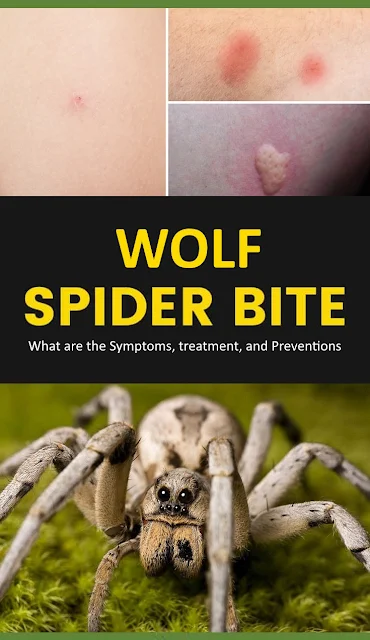A wolf spider bite frequently results in ripped, fang-like markings on the skin. Bite wounds occasionally cause erythema, edema, and ulceration. To treat the bite, wash the area where it bit you, then bandage it. Take an antihistamine to get rid of the itching.
Any spider can bite a human. Their natural response is to see a threat. Some spiders are more dangerous than others based on the poison they produce.
Wolf spiders (Lycosa), though they rarely cause fatalities in humans, can still bite and cause serious symptoms. These spiders are widespread across the country.
Wolf spider bites typically don't result in serious consequences because they don't contain poison. If your symptoms worsen, let your doctor know.

Some characteristics of wolf spider
The wolf spider is a big, hairy spider. They have large, bright eyes that stand out. They are anywhere between 1/2 inch to 2 inches long. Wolf spiders generally have gray bodies with dark gray or brown marks.
Due to its size and coloring, the wolf spider is commonly mistaken for a brown recluse spider. On the other hand, the recluse spider is primarily brown and has a darker marking in the shape of a violin behind its head.
To grab their prey, wolf spiders do not spin webs. Therefore, they go food hunting alone. On the sides of their bodies, they also carry eggs.
You might find them more frequently when it’s too chilly to seek food at night in the fall. They hide in closets, basements, and garages, among other locations. A houseplant could be home to a wolf spider.
Most of the time, these hairy spiders hide from humans.
Symptoms of Wolf Spider Bite
Wolf spiders rarely bite humans. But if you accidentally touch a wolf spider, it might bite you.
Bites from wolves seem similar to those from other insects. A red, itch-inducing, swelling lump may be visible. Sometimes within a few days, it disappears. It’s often easier to identify what bit you if you saw the wolf spider.
Spider bites might cause allergic reactions in certain people. If you have: You could require immediate treatment.
- A red line emerges from the bite and acts as a symptom of a blood infection
- A swelling that becomes bigger and resembles hives
- swelling around the mouth and some other areas of the face
- Problem in breathing
- Losing consciousness or dizziness
Only brown recluse and black widow spiders may attack people in the United States with poison.
The ache from a brown recluse spider bite will greatly increase eight hours following the encounter. A purple ulcer progressively develops from the red bite, potentially destroying the skin around it. Along with these symptoms, you’ll also have chills and, fever, common colds.
Extreme pain, abdominal discomfort, and sweat may result after a black widow spider bite. None of these signs are brought on by a wolf spider bite.
What’s the treatment after the bite?
There are a few important actions a person can take after getting bitten by a wolf spider to ensure prevent illness and treat any inflammation, itching, or soreness:
- Wash the affected area with soap and warm water.
- To decrease swelling, use ice cubes.
- Taking over-the-counter antihistamines might help if the bite is extremely irritating.
- Do not scrape, as this may raise the possibility of infection.
The symptoms should start to disappear within a few days. If they don’t, consult a doctor for guidance and potential therapy.
How to Prevent Wolf Spider Bite?
- Wolf spiders live alone. Since they don’t make webs, it can be challenging to determine if they are present.
- Due to this, bite prevention may be challenging.
- People must inspect their shoes or clothing to ensure no spiders are living inside them.
- If they keep them in a position that is easily accessible from the outside.
- In areas like garages, sheds, and lofts, exercise additional caution.
- A few wolf spiders make their homes in leafy areas, so people should take care here anyway.
- The probability of a wolf spider entering a residence from the outside can be greatly decreased by using sufficient insulation in dwellings.
- Windows, exterior doors, lofts, and basements are just a few examples of places where insulation can be very helpful.
Conclusion
Wolf spider bites are often extremely rare, so people should not overly alarmed.
If a person comes into direct touch with a wolf spider and feels intimidated, the spider will often bite that person. The possibility of getting bitten can be decreased by exercising caution in regions where wolf spiders may be present.
Most wolf spider bites do not need immediate treatment. Consult a doctor if symptoms suddenly worsen, persist for a long time, or if a person generally feels poorly.
